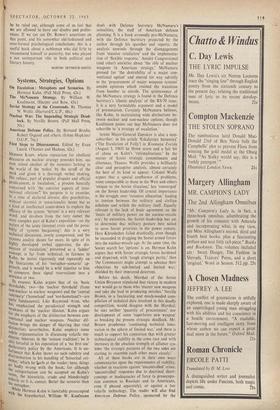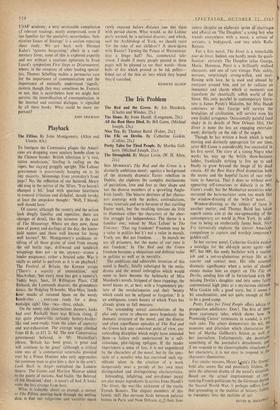Systems, Strategies, Options On Escalation : Metaphors and Scenarios. By
Herman Kahn. (Pall Mall Press, 42s.) HERMAN KAHN, whose reputation for ebullient discourse on nuclear strategy precedes him, :las now seized another of the monsters lurking in the world of the 'nukes' by the scruff of the neck and given it a thorough verbal shaking. His subject, part of popular disquiet and official predicament, is 'escalation,' a process basically concerned with 'the coercive aspects of inter- national relations', his purpose is to examine, in a time of declared détente, dire possibilities, without alarmist or sensationalist intent but as a kind of intellectual count-down to explore the efficacy of the system. 'System' is a very relevant word, and involves from the very outset the most complex part of Kahn's exposition—on the nature of the acute (intense) crisis and the possi- bility of 'systems bargaining'; this is a very technical discussion, overly compressed, and the systems analyst shouts for more. In spite of its highly developed verbal apparatus, the dis- cussion of 'escalation,' presented as a 'ladder' Concept, is far from technical; in fairness to Kahn, he insists vigorously and repeatedly on the limitations of his 'metaphor-scenario' ap- proach, and it would be a wild injustice to him to compress these signal reservations into a sentence or two..
, In essence, Kahn argues that of six 'basic thresholds,' two—the 'nuclear threshold' (from non-nuclear to nuclear weapons) and the 'central sanctuary' (`homeland' and `not-homeland').---are quite fundamental. Like Raymond Aron, who has emphasised the paradoxical strength and for of the 'nuclear illusion,' Kahn argues ler the emphasis of the distinction between con- ventional and nuclear weapons. Nuclear dif- fusion brings the danger Of blurring that vital distinction; nevertheless, Kahn employs some subtle argumentation in discussing volatile ten- nencies inherent in the 'nonuse tradition'; he is also forceful in his exposition of a `no first use' declaratory policy by the Americans. It is un- fortunate that Kahn shows no such subtlety and
in his handling of 'historical evi-
d ,e_nee,' which he hurls at the reader; here, things so badly wrong with the book, for although the categorisation can be accepted on Kahn's the historicity, crude and blunderingly eteerinis
ectic as it is, cannot. Better the scenario than the metaphor. while Herman Kahn is inevitably preoccupied with the hypothetical, William W. Kaufmann deals with Defence Secretary McNamara's actualities, the stuff of American defence planning. It is a book avowedly pro-McNamara, with the Defence Secretary projected by the author through his speeches and reports; the analysis unwinds through the disengagement from 'massive retaliation' and the implementa-, tion of 'flexible response.' Amidst Congressional (and other) anxieties about 'the role of nuclear weapons in American strategy,' McNamara pressed for 'the desirability of a major con- ventional option' and steered his way adroitly in the 'procurement of major weapons systems' amidst opinions which resisted the transition from bomber to missile. The quintessence of the McNamara strategy is found in the Defence Secretary's 'classic analysis' of the RS-70 issue; it is a very formidable argument and a model of presentation. Certainly McNamara believes, like Kahn, in maintaining wide distinctions be- tween nuclear and non-nuclear options, though Kaufmann points out that McNamara does not subscribe to 'a strategy of escalation.'
Soviet Major-General Zemskov is also a non- subscriber; in his article 'Eskalatsiya bezumiyg' ('The Escalation of Folly') in Krasnaya Zvezda (August 3, 1965) he threw scorn and a fair bit of abuse on Kahn's 'rationalisations.' In the matter of Soviet strategic commitments and dilemmas, Thomas Wolfe provides a brilliantly clear and perceptive analysis, almost certainly the best of its kind to appear. Colonel Wolfe argues that -a special confluence of problems, some comparable to those in the West and others `unique to the Soviet situation.' has 'converged' on the Soviet leadership. Of crucial importance is the struggle over 'resource allocation,' leading to tension between the military and civilian echelons and within the military itself. Equally relevant is the lack of basic agreement on the 'limits of military power on the nuclear-missile era'; by extension, the Soviet leadership has yet to determine that military posture best suited to serve Soviet priorities in the power contest. Here Khrushchev failed drastically, even though he succeeded in dragging the Soviet armed forces into the nuclear-missile age. At the same time, the Soviet search for 'options' is on. Herman Kahn argues that with Soviet strategic forces hardened and dispersed, with 'rough strategic parity,' then `the Communists might attempt to advance their objectives by sub-limited and limited war,' shielded by their improved deterrent.
Before his death, Marshal of the Soviet Union Biryuzov stipulated that victory in modern -war would go to those who 'master new weapons and take the lead in producing missiles.' Neville Brown, in a fascinating and much-needed corn- pilation of technical data involved in this deadly competition, would disagree with the Marshal; he sees neither 'quantity of procurement' nor development of some 'superlative new weapon' as breaking the present strategic deadlock. Mr. Brown prophesies 'continuing technical inno- vation in the sphere of limited war,' and there is much to support his contention that with greater technological stability in the arms race and with increases in the absolute strength of alliance sys- tems 'the strategic postures of the two sides are starting to resemble each other more closely.'
All of these books are in their own ways commentaries upon the requirements of stability, whether in reactions against 'uncontrolled' crises, 'uncontrolled' responses due to doctrinal short- comings or inadequacies of force (a preoccupa- tion common to. Russians and to Americans, even if phased separately), or against a too volatile technology. The reader will also find American. Defense. Policy, sponsored by the USAF academy, a very serviceable compilation a relevant readings, neatly compressed, even if too familiar for the specialist; nevertheless, 'Sub- stantive Issues of Strategy' is a section repaying close study. We are back with Herman Kahn's 'systems bargaining,' albeit in a rudi- mentary form; some of this is explored expertly and not without a cautious optimism in Evan Luard's symposium First Steps to Disarmament. where, in the company of other leading special- ists, Thomas Schelling makes a persuasive case for the importance of communication and the importance of mutually. understood 'signals,' esoteric though they may sometimes be. Esoteric or not, that is nevertheless how we might best survive; the intensification of communication, in the internal and external dialogue, is signalled by all these books. What could be more im- portant?
3011N P.RICKSON































 Previous page
Previous page